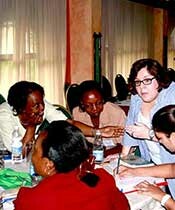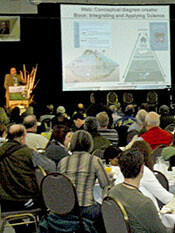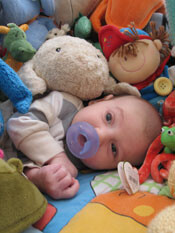
Conservation International Economic Incentives Guidebook released
 Conservation International has been working with IAN staff to develop a series of publications regarding Marine Managed Areas as part of their Science to Action program. The next report in the publication series was just released. The Economic Incentives Guidebook (40 pp.) provides details on designing effective economic incentives in order to motivate sustainable human behavior relative to marine managed areas. Twenty-seven case studies worldwide are summarized.
Conservation International has been working with IAN staff to develop a series of publications regarding Marine Managed Areas as part of their Science to Action program. The next report in the publication series was just released. The Economic Incentives Guidebook (40 pp.) provides details on designing effective economic incentives in order to motivate sustainable human behavior relative to marine managed areas. Twenty-seven case studies worldwide are summarized.
Two international NGOs invite IAN to science outreach conference in Zanzibar
 The International Foundation for Science (IFS) and the Western Indian Ocean Marine Sciences Association (WIOMSA) hosted a Science Outreach conference in Zanzibar, Tanzania the week of December 6-10. The scientists working in the WIO are faced with the on-going challenge of effectively communicating their research results to the local community of resource managers and resource users, many of whom are subsistence fishers. IAN's Bill Dennison, Jane Hawkey, and Kate Bentsen, along with Guiseppe DiCarlo from Conservation International were invited to conduct a one-day science communication workshop for the 70 participants, providing the scientists with tools to accomplish this task. For more details on the workshop, read Bill's Zanzibar series of blog posts.
The International Foundation for Science (IFS) and the Western Indian Ocean Marine Sciences Association (WIOMSA) hosted a Science Outreach conference in Zanzibar, Tanzania the week of December 6-10. The scientists working in the WIO are faced with the on-going challenge of effectively communicating their research results to the local community of resource managers and resource users, many of whom are subsistence fishers. IAN's Bill Dennison, Jane Hawkey, and Kate Bentsen, along with Guiseppe DiCarlo from Conservation International were invited to conduct a one-day science communication workshop for the 70 participants, providing the scientists with tools to accomplish this task. For more details on the workshop, read Bill's Zanzibar series of blog posts.
Bill Dennison gives keynote address on communicating science at the Latornell conference, Ontario, Canada
 Bill Dennison was invited to give a keynote address at the 2010 Latornell conference in Toronto, Ontario, Canada. His presentation, entitled "Communicating science effectively to engage decision-makers", detailed many of the techniques and resources that IAN uses and provides to more effectively communicate science. The talk included discussions on the importance of incorporating visual elements, with reference to IAN's symbol libraries, image library, and online conceptual diagram creator. Bill went through the history of effective science communication, including examples of how it has changed the world. Finally, he talked about the effectiveness of report cards to synthesize large amounts of information into digestible chunks, making them a very powerful way to communicate. For more details on the seminar, read Bill's Latornell conference series of blog posts.
Bill Dennison was invited to give a keynote address at the 2010 Latornell conference in Toronto, Ontario, Canada. His presentation, entitled "Communicating science effectively to engage decision-makers", detailed many of the techniques and resources that IAN uses and provides to more effectively communicate science. The talk included discussions on the importance of incorporating visual elements, with reference to IAN's symbol libraries, image library, and online conceptual diagram creator. Bill went through the history of effective science communication, including examples of how it has changed the world. Finally, he talked about the effectiveness of report cards to synthesize large amounts of information into digestible chunks, making them a very powerful way to communicate. For more details on the seminar, read Bill's Latornell conference series of blog posts.
Life after IAN: PhD graduate Ben Fertig begins fatherhood as a postdoc at Rutgers University
 The New Year brings new adventures for Ben Fertig - with a new baby (Isaac Solomon, 3 1/2 months), new degree, and new job! Ben will be moving on to Rutgers University Institute of Marine and Coastal Sciences as a postdoctoral associate with Michael Kennish. At Rutgers, Ben will be employing 'Integration' and 'Application' skills learned at IAN by compiling and synthesizing available datasets to develop biotic, benthic, and ecosystem health indices for New Jersey's coastal bays and coastal ocean. This opportunity will continue to poise Ben for communicating broadly with scientists and environmental managers at federal and state levels. Timely and relevant, this particular postdoc enables Ben to adapt IAN's bioindicator development, ecosystem health assessment, and report cards. The 2 year postdoc starts Jan 10, 2011. So long and thanks for all the oysters! (Apologies to Douglas Adams.)
The New Year brings new adventures for Ben Fertig - with a new baby (Isaac Solomon, 3 1/2 months), new degree, and new job! Ben will be moving on to Rutgers University Institute of Marine and Coastal Sciences as a postdoctoral associate with Michael Kennish. At Rutgers, Ben will be employing 'Integration' and 'Application' skills learned at IAN by compiling and synthesizing available datasets to develop biotic, benthic, and ecosystem health indices for New Jersey's coastal bays and coastal ocean. This opportunity will continue to poise Ben for communicating broadly with scientists and environmental managers at federal and state levels. Timely and relevant, this particular postdoc enables Ben to adapt IAN's bioindicator development, ecosystem health assessment, and report cards. The 2 year postdoc starts Jan 10, 2011. So long and thanks for all the oysters! (Apologies to Douglas Adams.)